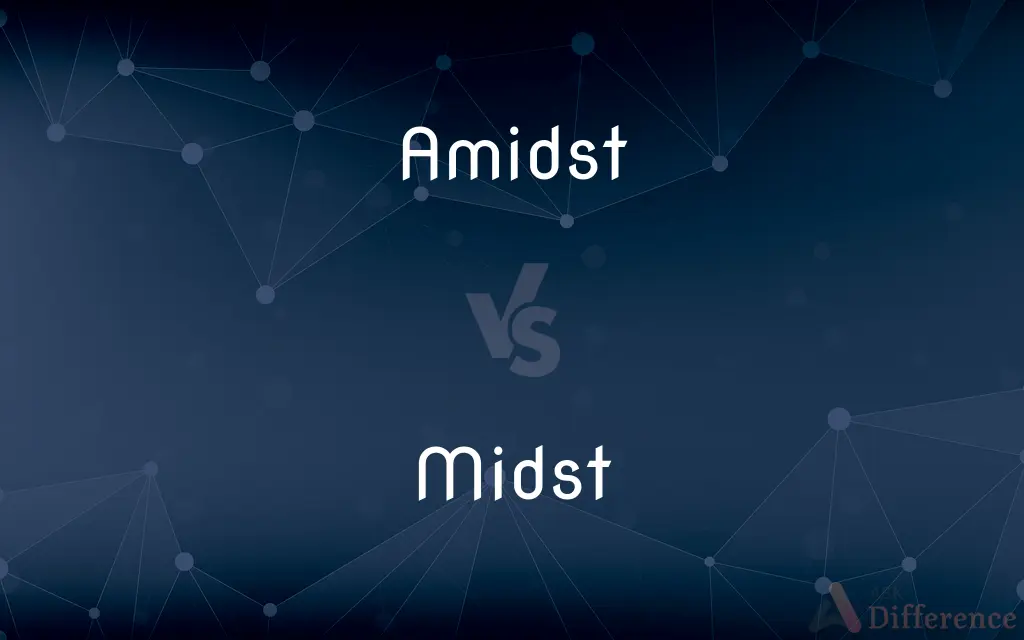Amidst vs. Midst — What's the Difference?
Edited by Tayyaba Rehman — By Fiza Rafique — Updated on March 12, 2024
"Amidst" denotes being surrounded by or in the middle of something, with a sense of immersion, while "midst" refers to the central part or point of something, focusing more on location.

Difference Between Amidst and Midst
Table of Contents
ADVERTISEMENT
Key Differences
Amidst is often used to convey a sense of being surrounded by or involved in a particular environment or situation. It implies a deeper immersion within something, whether it be physical or metaphorical, whereas midst typically refers to the very center or core of something, emphasizing location or position without the connotation of being enveloped by it.
While "amidst" can be used to describe being in the middle of an action or event, suggesting involvement or participation within a context, "midst" is more likely to be used to pinpoint a specific phase or point within a process or time frame, focusing less on the surrounding environment and more on the idea of centrality.
In literary or poetic contexts, "amidst" might be preferred for its slightly more archaic or formal tone, evoking a sense of being enveloped by or deeply embedded within something. On the other hand, "midst" can be seen as more straightforward and modern, suitable for clear, precise descriptions of location or timing.
"Amidst" might also suggest a broader, more immersive context, such as being amidst a crisis or amidst nature, indicating a comprehensive involvement. Conversely, "midst" could be utilized to denote a specific moment or position within a broader context, like in the midst of a conversation, highlighting a particular point rather than a surrounding situation.
Both terms can be used interchangeably in many contexts, but the choice between them might be influenced by the desired nuance of immersion versus location, the formality of the language, or the specificities of the context they are used in.
ADVERTISEMENT
Comparison Chart
Definition
Being surrounded by; in the middle of.
The central part or point.
Connotation
Implies immersion within an environment.
Focuses on location or centrality.
Usage
Preferred in poetic or formal contexts.
Used for clarity and precision.
Nuance
Suggests a broader, immersive context.
Indicates a specific moment or position.
Example Context
Amidst the chaos, there was hope.
In the midst of the conversation, she smiled.
Compare with Definitions
Amidst
Surrounded by; in an enveloping space.
Amidst the dense fog, the lighthouse was barely visible.
Midst
A specific point or phase within a process.
In the midst of preparations, she realized she was missing ingredients.
Amidst
Being in the middle of a situation or event.
He found calm amidst the storm.
Midst
Referring to the immediate environment or context.
In the midst of confusion, clarity often emerges.
Amidst
Within a particular environment or setting.
Amidst the hustle and bustle of the city, a quiet park offered solace.
Midst
Surrounded by or among other things.
The spy remained unnoticed in the midst of the crowd.
Amidst
Amid or in the midst of, with a poetic or formal tone.
Amidst ancient ruins, history whispers.
Midst
The middle phase of an ongoing action or event.
In the midst of the game, the power went out.
Amidst
In the company of; surrounded by others.
Amidst her friends, she felt secure.
Midst
The central part or core of something.
The tree stood tall in the midst of the forest.
Amidst
Variant of amid.
Midst
In the middle of.
Amidst
In the midst or middle of; surrounded or encompassed by; among.
Midst
The middle part or point
He left his flat in the midst of a rainstorm
Amidst
In the midst or middle of; surrounded or encompassed by; among.
But rather famish them amid their plenty.
The seraph Abdiel, faithful found;Among the faithless faithful only he,
From amidst them forth he passed,
Those squalid cabins and uncleared woods amidst which he was born.
Midst
The middle position or part; the center
In the midst of the desert.
Midst
A position of proximity to others
A stranger in our midst.
Midst
The condition of being surrounded or beset by something
In the midst of all of our problems.
Midst
A period of time approximately in the middle of a continuing condition or act
In the midst of the war.
Midst
Among; amid.
Midst
A place in the middle of something; may be used of a literal or metaphorical location.
Midst
(rare) Among, in the middle of; amid.
Midst
The interior or central part or place; the middle; - used chiefly in the objective case after in; as, in the midst of the forest.
And when the devil had thrown him in the midst, he came out of him.
There is nothing . . . in the midst [of the play] which might not have been placed in the beginning.
Midst
Hence, figuratively, the condition of being surrounded or beset; the press; the burden; as, in the midst of official duties; in the midst of secular affairs.
Midst
In the midst of; amidst.
Midst
In the middle.
Midst
The location of something surrounded by other things;
In the midst of the crowd
Common Curiosities
Why choose "amidst" over "midst"?
"Amidst" might be chosen for its more poetic or formal tone and to convey a sense of immersion within a context.
How is "midst" used?
Midst is used to denote the central part or point of something, focusing on location or centrality.
Can "amidst" and "midst" be used interchangeably?
Yes, in many contexts, "amidst" and "midst" can be used interchangeably, though nuances in meaning might make one more suitable than the other.
How does the formality of context affect the choice between "amidst" and "midst"?
"Amidst" may be preferred in more formal or poetic contexts, whereas "midst" is suitable for clear, precise descriptions.
Is "midst" more modern than "amidst"?
"Midst" can be considered more straightforward and possibly more modern, especially when used for clarity and precision in location or timing.
Is "amidst" always related to physical spaces?
No, "amidst" can also relate to metaphorical or situational contexts, not just physical spaces.
Can "midst" be used to describe emotional states?
Yes, "midst" can be used metaphorically to describe being at the central point of an emotional state or process.
What does "amidst" mean?
Amidst means being surrounded by or in an enveloping space, often with a sense of immersion.
Can "midst" refer to time as well as place?
Yes, "midst" can refer to a specific moment within a time frame, in addition to physical location.
Is there a difference in the level of detail conveyed by "amidst" vs. "midst"?
"Amidst" might imply a more detailed, immersive experience, while "midst" focuses on the central aspect or moment.
What is the difference in connotation between "amidst" and "midst"?
"Amidst" connotes a broader, immersive context, while "midst" focuses on a specific central location or point.
What is an example of "amidst" in a sentence?
"Amidst the chaos of the city, she found a peaceful garden."
How does "midst" convey centrality?
"Midst" specifically points to the central part or most intense phase of a situation, emphasizing its core aspect.
Why might a writer choose "amidst" for descriptive writing?
A writer might choose "amidst" for its ability to convey a deeper sense of being enveloped by or actively involved in the surroundings.
How does the choice between "amidst" and "midst" affect the tone of a sentence?
Choosing "amidst" can add a more formal or evocative tone, while "midst" might lend a more direct and precise tone.
Share Your Discovery

Previous Comparison
Matrix vs. Table
Next Comparison
Active vs. InactiveAuthor Spotlight
Written by
Fiza RafiqueFiza Rafique is a skilled content writer at AskDifference.com, where she meticulously refines and enhances written pieces. Drawing from her vast editorial expertise, Fiza ensures clarity, accuracy, and precision in every article. Passionate about language, she continually seeks to elevate the quality of content for readers worldwide.
Edited by
Tayyaba RehmanTayyaba Rehman is a distinguished writer, currently serving as a primary contributor to askdifference.com. As a researcher in semantics and etymology, Tayyaba's passion for the complexity of languages and their distinctions has found a perfect home on the platform. Tayyaba delves into the intricacies of language, distinguishing between commonly confused words and phrases, thereby providing clarity for readers worldwide.
















































